Archive for the 'competitiveness' Category
May 22nd, 2013 by JJW
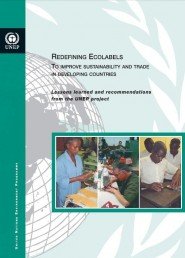
In 2012, at the invitation of the United Nations Development Programme (UNEP) Sustainable Consumption and Production branch, I had the pleasure of interviewing and working with dozens of stakeholders from over a dozen countries to explore how ecolabels are encouraging sustainable development and improving international trade opportunities. The report “Redefining ecolabels to improve sustainability and trade in developing countries: Lessons learned and recommendations from a UNEP project” explores both the history and background of ecolabelling as a tool to promote sustainable production and consumption and to evaluate a specific five-year UNEP project.
You can download the report here on the new (and very informative) Sustainable Production and Consumption Clearinghouse.
More about this report from the introduction:
This report aims to evaluate to what extent the project succeeded in reaching its intended goals, to draw lessons learned, and present recommendations for future actions. The report contains four major sections. Section I introduces readers to ecolabels and the differences between different information systems, provides an overview of how these systems are used in developed and developing countries as well as introduces the major challenges, opportunities, and debates around voluntary labelling and standards globally.
Section I also traces the debates about ecolabels as possible barriers to trade. This includes possible implications of recent World Trade Organization cases and other issues affecting the discussions on Technical Barriers to Trade, and the relevance of this UNEP project to the debates, including the importance of working with established rules, practices, and disciplines that avoid unnecessary barriers in developing and using internationally-accepted ecolabels.
Section II introduces the UNEP ‘Enabling developing countries to seize ecolabelling opportunities’ project and partners, and the assessment methodology.
Section III of this report focuses on the assessment of the project results in relation to its goals. This section is based on interviews with key stakeholders in the project, as well as background research. It reviews the project as a whole, including a sector and country analysis. It describes the baseline situations and major developments that happened during the five years of the project.
Section IV provides lessons learned and recommendations to project partners and other stakeholders on further improvement and future projects. Suggestions are targeted toward all stakeholders involved in the ecolabelling field.
The report’s methodology is based on the compilation and review of all project documents and relevant literature on trade and ecolabels. It also involved interviews with participants from the project, including funders, implementing bodies, country partners, and some target enterprises when available.
October 11th, 2011 by JJW

Ever since I got a sneak peak at the evidence Chinese environmental groups recently leveled against Apple, I’ve been researching, gasping, and writing about some appalling practices and how to improve them. Not only does the production of personal electronics rank low on social and environmental impacts, but Apple’s practices put it at the bottom of a very gross barrel.
Since I’m trying to make things better rather than sink into misery, I thought it was time I update a little of the progress that’s been made since I wrote my “open letter to Apple.” (original version here, to ChinaDialogue version here).
Note: I have always been a big fan of Steve Jobs and feel saddened by his early demise. I note that it is important to grieve, but grief is not a reason to stop making progress on this very important issue. On the contrary, I think that Apple should work to improve the social and environmental impacts involved in manufacturing its products as a way to burnish and secure the legacy of its founder.
Apple Opens Up, But More Progress Needed
First, and most importantly, Apple apparently has broken its silence and agreed to speak with NGOs and other stakeholders about the alleged social and environmental issues at its suppliers in China. (See the ChinaDialogue article “Apple Breaks its Silence” by Xie Xiaoping).
This is positive–even amazing–news which shows, just maybe, that Apple’s sustainability team is waking up to the power of effective stakeholder engagement.
For a very informative look at how a big brand used stakeholder engagement to overcome major difficulties, read the MIT Sloan Review article “How Gap Inc. Engaged With its Stakeholders” by industry veteran Sean Ansett and colleagues.
Conclusions from “How Gap Inc. Engaged With its Stakeholders” that Apple might benefit from:
- Stakeholder engagement is not easy; the process is often expensive and slow.
- Identifying and prioritizing stakeholders can enable a company to focus on developing relationships with a few key stakeholder organizations.
- Over time, Gap’s stakeholder engagement strategy has improved perceptions of the company.
I hold my breath that Apple will increase sustainability information transparency. The company still seems to see its supply chain as a risk to its brand, rather than an opportunity to engage and bolster its brand, much less begin to lead the IT industry toward greater transparency and responsible management of manufacturing impacts.
Holding Tech Companies Accountable through Stronger International NGO and Media Action
Secondly, I take issue with how the press characterized the August 31, 2011 revelation in the IPEA report “The Other Side of Apple (II): Pollution Spreads Through Apple’s Supply Chain” story as simply about how Chinese environmental groups were accusing Apple of misdeeds, rather than investigating the claims themselves. I am glad the story made headlines, but not investigating further seems like bad journalism.
On a larger and wider note, the press has almost universally failed to address the more systematic concerns the report brought up, like whether Apple should be exempt from taking responsibility for the ways in which its products are made. Some stories are exceptions, which I note below.
I guess I should be happy that the story got headlines in almost every major newspaper. I just hope the issues do not get swept aside. Now that the world is over the shock of the loss of Steve Jobs, how long before the admiration Apple fans have gets wedded to a serious movement to hold technology companies to account?
As he told TechCrunch, Monologist Mike Daisey characterizes Apple’s current manufacturing processes as Apple’s “terrible sin.”
He also points the finger at himself and everyone listening to say it’s “irresponsible for us not to consider” these issues. I completely agree with him. In fact, Daisey has become one of my favorite public figures, not just for his consciousness-raising work on Apple (I have yet to see, read or hear his latest work “the Agony and Ecstasy of Steve Jobs”), but because he is also so articulate, expressive, and expressive while also being very socially aware, and engaged enough to do something about his feelings.
Daisey rightly points out that “there are no nonprofits within the tech industry that are even concerned with these issues.” He adds, “There’s no one even petitioning these companies in the first world to have independent monitoring in the third world.”
Daisey states (incorrectly) that there is “nobody [monitoring] on the ground in China.” What I would say is that there are not as many people on the ground as there should be. There are a number of international voluntary standards and company codes of conduct that are dedicated to improving working conditions in China and around the world. His point, I think, is that Apple and other tech companies have chosen to spend more resources trying to prevent consumers and the public from seeing what is happening in factories than on improving conditions there. Such backward stances by these companies go against the historical currents of our times, which flow toward more transparency, not less, and hopefully, over time, lead to more sustainability outcomes that improve everyone’s circumstances. In an era of economic globalization, we need solutions like international voluntary sustainability standards adequately applied to lift everyone’s boats.

To illustrate just how silly it is to try to prevent supply chain transparency, even NGOs and consumers in China are starting to wake up to social and environmental issues. (See this story on Al-Jazeera, from which the picture above was taken).
This video of Mike Daisey is very eye-opening, entertaining, and visionary (sorry, the video doesn’t seem to be displaying, despite the embed, so click here to view the video, accompanying TechCrunch story, and other videos from the interview):
Other Stories about Apple
Thirdly, since writing the open letter to Apple, I have come upon many more resources and articles about Apple and I’d like to share them. A big thanks goes to folks like Rich Brubaker at CollectiveResponsibility/All Roads Lead to China/CEIBS and other comrades in the sustainability sector in China. I thank Rich, in particular, for introducing me to Mike Daisey’s work.
Here are some other stories about Apple and Jobs that I haven’t linked to elsewhere in this post:
The Human Side of Tech Manufacturing
Lastly, through reviewing this information, I have come to see more of the human side of global manufacturing. Yes, I’ve toured factories in China before, yes I’ve read statistics, written reports, interviewed manufacturing company presidents, attended stakeholder meetings of international labor standards like Social Accountability International (SA8000) in China, read Peter Hessler’s books, and so on, but I had never thought about workers in quite the same way as after seeing this brief documentary/video “Dreamwork China,” which interviews and photographs Foxconn workers:
Click on Dreamwork China to see more.
I look forward to watching how journalists, supply chain experts, responsible investment gurus, CSR managers, members of civil society, researchers, policy experts, and others respond to Apple’s invitation to help get its house in order. I hope these stakeholders work together to implement a long-term vision and spur Apple along the noble path, even if it strays.
July 5th, 2011 by JJW
“If China grasps the opportunities offered by sustainable certification, it can reap commercial, environmental and social rewards, while helping set the rules for a greener global economy.
International voluntary sustainability standards – such as the Forest Stewardship Council, which certifies sustainably managed forests and forest products – are tools for verifying socially sound and eco-friendly goods and services that play an increasingly important role in global trade. However, they are still relatively new and underused in China. These standards offer Chinese companies, officials and NGOs new ways to take part in setting the rules of the global economy, and a powerful instrument to help the country’s companies gain market rewards for good social and environmental performance. This is a soft-power strategy worthy of attention.”
Continue reading the full article on China Dialogue.
Or read my little explanation here. I feel as if this article hardly should be published with my name alone, for it has been the product of years of research with some of the greatest minds in sustainable development and economics that I have ever had the chance to work with.
The ideas of this article grew out of work I did with Simon Zadek (then Chief Executive of AccountAbility) and Long Guoqiang of the Development Research Center of the Chinese State Council, then vice director of the foreign economics department (now director). When we released the initial copy of our report “Advancing the Sustainable Competitiveness of China’s Transnational Corporations,” (final version here) Isabel Hilton, editor of China Dialogue, asked me to write about it on China Dialogue. In the meantime, I’ve gotten more familiar with the world of certification-based international voluntary sustainability standards and find them especially compelling as sustainable development tools among the panoply of possible approaches. So this China Dialogue article shows my interest in these types of standards. You won’t get a summary of the original research I did with Zadek and Long, but I hope the article does help you understand how sustainability standards are in many ways leading best practices with measurable positive sustainable development impacts that can help underpin China’s ambitions to be a sustainable global power.
April 2nd, 2011 by JJW
Since moving out of Beijing in August 2010, I do not get as many chances to give speeches in Chinese. Here are some links to a few of my Chinese language speeches and interviews:
- October 2010: Chinese language presentation on the ISEAL Alliance and an overview of international standards affecting the sustainable development of tea at the 2nd International Forum on Sustainable Development of China’s Tea Industry sponsored by the China Tea Marketing Association and the Beijing Xicheng Government 02_Joshua Wickerham ISEAL Beijing Tea meeting_Oct 19_2010
- July 2009: A speech on China’s “accountability innovations” at the “First Corporate Social Responsibility Annual Conference of China” hosted by The Chengdu People’s Government and the China Southern Weekend newspaper group. It’s as if they chose the worst possible picture of the foreigner.
- June 2009: A NetEase video interview on China’s sustainable trade options. Forgive the crazed expression. It was a stressful time for me.
Ok, now back to the tasks at hand.
September 11th, 2010 by JJW
 When I moved to Qingdao in 2002 after finishing undergrad, I lived in one of China’s earliest and largest national-level economic and technological development zones. Pervading The Zone were massive billboards displaying 10-meter high bust shots of the octogenarian Deng Xiaoping. Deng Xiaoping is widely recognized as laying the thoughts that have steered China to economic success over the last 30 years of “reform and opening up”. His steady, posthumous gaze seemed to be guiding the construction of infrastructure in The Zone. His vision shone upon the future bridge connecting The Zone to old Qingdao, and upon the various refineries and factories. His plan penetrated the department stores full of mannequins, sales staff and no customers. This was an eerie, eye-opening time, and The Zone had major impacts in how I have subsequently come to view the world.
When I moved to Qingdao in 2002 after finishing undergrad, I lived in one of China’s earliest and largest national-level economic and technological development zones. Pervading The Zone were massive billboards displaying 10-meter high bust shots of the octogenarian Deng Xiaoping. Deng Xiaoping is widely recognized as laying the thoughts that have steered China to economic success over the last 30 years of “reform and opening up”. His steady, posthumous gaze seemed to be guiding the construction of infrastructure in The Zone. His vision shone upon the future bridge connecting The Zone to old Qingdao, and upon the various refineries and factories. His plan penetrated the department stores full of mannequins, sales staff and no customers. This was an eerie, eye-opening time, and The Zone had major impacts in how I have subsequently come to view the world.
My strongest impression of Life in The Zone was one of Deng’s key quotes emblazoned everywhere on those giant billboards or in neon signs at the major entrances to the zone:  . (Chinese isn’t working for me in WordPress….most of the signs had “fazhan cai shi ying daoli” instead of the pictured “fazhan shi ying daoli“)
. (Chinese isn’t working for me in WordPress….most of the signs had “fazhan cai shi ying daoli” instead of the pictured “fazhan shi ying daoli“)
The English translation: “Development is the main principle.” Since I could could not read or speak a lick of Chinese when I crash landed there in Shandong Province, only after many more years of studying Chinese would I realize the more literal and telling translation of most of these signs (but not the sign pictured, if you want to get technical): “Development is the only hard truth.”
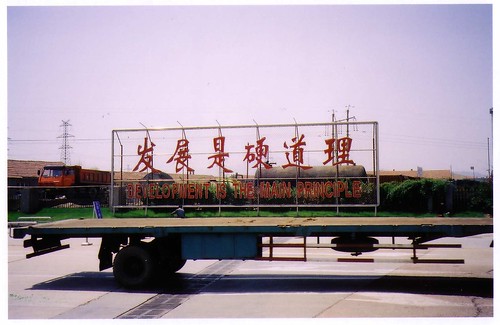
This hard truth had a profound affect on my psyche and my priorities. One of the most mind-boggling aspects to my young American mind undergoing its first China experiences then was just how much I had taken for granted that different levels of development have profound effects on peoples’ lives. Life in The Development Zone left the indelible impression that my rather self-involved American priorities were in need of a tune-up. Soon I was no longer the cynical postmodernist my education and culture had taught me was fine to strive for. I decided to devote hours and hours every day to studying Chinese and learning the mechanisms to explain China’s economic miracle.
I also fretted that all this economic growth would lead to unprecedented environmental destruction and decided to learn enough about the situation to (hopefully) make a difference.
I figure that a new paradigm combining the pragmatism and razor insight of Premier Deng with the advances in science, business strategy, and human ingenuity that development brings is one of the best strategies for steering our planet toward ecological, social, and economic sustainability.
When Fortune China‘s editor-in-chief asked me to blog for his magazine after he saw me speak at a American Chamber of Commerce in Hong Kong event organized by my friend Ed Ahnert on “corporate responsibility policy in China: opportunities for competitive advantage,” I decided to take him up on the offer.
Blogging for Fortune China, Celebrating 30 years of “Reform and Opening Up”

Corresponding with the thirtieth anniversary of Deng’s “reform and opening up” policy celebrated this month, I decided to call my bilingual Fortune China blog “Sustainable Development is the Main Principle” .
To my mind, Deng’s greatest insight was the importance of taking practical measures to deepen the world’s level of economic and social interdependence. Corporations, inter-government organizations, and international nonprofit organizations are the main globalizers of our age. “Sustainable Development is the Main Principle” focuses on how these organizations are contributing to sustainable development, with a special focus on how multinational corporations can gain and maintain competitiveness in this fast-changing environment.
Sustainable Development is the Main Principle–first blog posts
- Stakeholder engagement in Chinese history and what it means for business today: the story of Yang Jisheng and the earliest example of “stakeholder engagement” I’ve been able to find in Chinese history;
- The power and point of TED: branding, strategy and good ideas: all about how TED presentations can help with work, presentation skills, and changing the world. This post especially profiles the presentation by the World Wildlife Fund’s Jason Clay on his work with global corporations and improving the sourcing of global commodities to reduce negative environmental impacts.
More soon to come! I hope you enjoy reading “Sustainable Development is the Main Principle“!
August 4th, 2010 by JJW
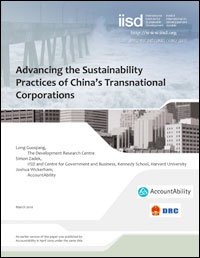 The International Institute for Sustainable Development (IISD) has published the final version of a paper I co-wrote with Simon Zadek and Long Guoqiang as part of a multi-year “sustainable trade strategy for China” with multiple stakeholders from China and abroad, supported by the Swiss SECO.
The International Institute for Sustainable Development (IISD) has published the final version of a paper I co-wrote with Simon Zadek and Long Guoqiang as part of a multi-year “sustainable trade strategy for China” with multiple stakeholders from China and abroad, supported by the Swiss SECO.
As IISD writes on its website,
“This paper examines how the Chinese business community can best use international sustainability standards to enhance its competitiveness in global markets, in so doing more effectively placing themselves on a sustainable economic path. We highlight the opportunity for Chinese businesses, supported by enabling public policies, to become a force in shaping the next generation of sustainability standards in global markets as a competitive strategy consistent with China’s broader interests. Doing this requires Chinese actors to engage more deeply in existing standards initiatives and take a more explicit role among the communities that have developed and now govern these standards. Effective engagement in such standards is a means of offsetting competitive disadvantages or creating competitive advantages when businesses and nations choose a more sustainable development path. This paper sets out both strategic options for businesses and policy options for the Chinese government to realize sustainable development and competitiveness goals.” —IISD Publications Centre
This is the final version of a paper launched a year earlier by AccountAbility, which I posted about here.
Download the final paper here.
July 8th, 2010 by JJW
 I spoke in June at the ISEAL Alliance annual conference, “Through the Looking Glass: The Future of Social and Environmental Standards,” in London on prospects for voluntary standards development in China and from a base in China. Here’s a bit of background and a summary of my presentation, now posted to the ISEAL Alliance website.
I spoke in June at the ISEAL Alliance annual conference, “Through the Looking Glass: The Future of Social and Environmental Standards,” in London on prospects for voluntary standards development in China and from a base in China. Here’s a bit of background and a summary of my presentation, now posted to the ISEAL Alliance website.
The ISEAL (International Social and Environmental Accreditation and Labeling) Alliance is a membership organization for international voluntary standards systems (VSS). ISEAL sets standards for standards groups and has been working on impacts codes. ISEAL members include the Forest Stewardship Council, the Marine Stewardship Council, Fairtrade Labeling Organization, UTZ Certified, Rainforest Alliance/Sustainable Agriculture Network, and many other standards groups that have been at the forefront of what Michael Conroy calls the ‘certification revolution.”
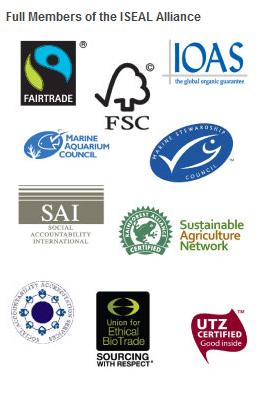 International voluntary standards systems (and ISEAL Alliance members in particular) are reshaping international markets through numerous ways. They help companies “compete up” on social and environmental impacts by offering credible market signals for what economic theory used to call externalities. These standards help governments enforce environmental regulations like the Lacey Act that prohibits importation of unsustainable wood in the US. They can hep companies and governments procure goods and services sustainably.
International voluntary standards systems (and ISEAL Alliance members in particular) are reshaping international markets through numerous ways. They help companies “compete up” on social and environmental impacts by offering credible market signals for what economic theory used to call externalities. These standards help governments enforce environmental regulations like the Lacey Act that prohibits importation of unsustainable wood in the US. They can hep companies and governments procure goods and services sustainably.
The conference was very interesting in that for the first time in my experience, multiple stakeholders from business, government, and the standards community were in the same room. Wal-Mart’s representative in charge of sustainable procurement had only heard the week before that standards organizations have such an important role. Standards groups had presentations on life-cycle analysis from leading actors like Greg Norris.
My presentation in London focused on China and voluntary standards. I got into this area through research on a “Sustainable Trade Strategy” for China with AccountAbility, the International Institute for Sustainable Development, the Chinese State Council’s think tank the Development Research Center. That researched focused largely on the role of voluntary standards in shaping the future competitiveness of China’s transnational corporations. The paper touched only lightly on the role China would have on voluntary standards systems. (Read more about that here). My presentation in London filled some of the gaps.
Here’s a link to my powerpoint on “International Voluntary Standards in China: Present Conditions and Future Possibilities”.
Here’s a quick summary of my presentation:
(I apologize that I write bare-bones powerpoints and I don’t have a transcript of my presentation).
1) Context: International voluntary standards developed largely at the “end of history” under US-dominated international market conditions and now face BRIC challengers.
2) China is doing a lot to develop its own standards and has the power to influence markets to benefit Chinese corporations and Chinese standards bodies (indeed, any other strategy would be illogical)
3) Prospects for the uptake of standards in China, ie, what Chinese consumers want, and which standards have already been taken up, etc.
4) Thoughts on MNC success in China and similar industry development, ie, the history of business registration in China, development of international accounting standards in China, and the recent rapid development of China’s Corporate Social Responsibility policy environment and company actions.
5) A common strategy for international VSSs: local interface/global consistency,
6) Priorities on achieving a move toward converging local and international standards in China so as to avoid setting back the development of standards in China.
After my presentation, I had two major takeaways:
1) International standards bodies know that China is a game-changer and they take it as a given that they must adapt quickly and in a coordinated way.
2) International stakeholders recognize that China is one of the few developing countries that can actually achieve relatively high success in getting international organizations and corporations to respect local norms, customs, and business environment. Or, in one participant’s words, (I paraphrase), “lots of developing countries ask companies to respect local development priorities, but only China can actually make this happen.” We were discussing this in the context of Google’s recent actions in the China market.
There’s a lot more work to be done in this area and the landscape is shifting fast.
June 5th, 2010 by JJW
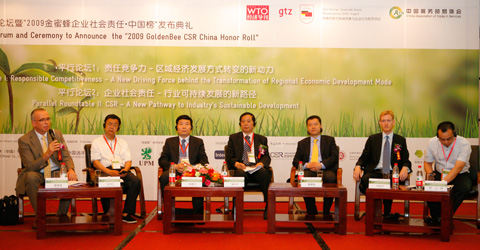
Fifth annual Golden Bee Conference: Regional Responsible Competitiveness Panel, image courtesy of WTO Tribune
Here is a summary of my remarks at the fifth annual Golden Bee conference in Beijing, speaking on a panel about how governments, companies, and civil society are working together to shift markets to reward responsible business action and make development more sustainable.
The session was chaired by the head of the Sino-German CSR Project, Rolf Dietmer, and had representatives from four provincial and district CSR initiatives, including Shandong, Shanghai Pudong, Jiangsu and Sichuan, plus a representative form China Unicom. My work with Chinese provincial economics planners has centered on the textiles and medicines sectors in Zhejiang through Responsible Competitiveness work with AccountAbility.
WTO Tribune wrote an article here (“Government duty-bound “responsibility”….in Chinese: ??“?”???) about the session here and captured some of my main points, but which I summarize here. (The entire transcript of my remarks in Chinese can be found here.
My main points:
1) Shifting markets to reward responsible business action requires a level playing field that no single sector (civil society, government, or business) can provide;
2) Chinese government officials at the provincial level are unsurpassed globally in their level of innovation and activity to promote new ways ;
3) Each provincial system is unique and there is need for coordination amongst local governments, the center and international stakeholders;
4) This unique approach to promoting sustainable development is both an asset and a liability, because if Chinese stakeholders do not coordinate properly, their market signals will be ignored by international buyers, ie, Chinese standards may not be recognized;
5) Chinese government officials, working with businesses, and using the power of the government bureaucracy, the media and civil society to promote good company practices and punish the bad, have the chance to clarify the way voluntary sustainability standards (such as the SA8000, GRI, ISO, AA1000, CSC9000T, FSC, etc) mature at the national and international levels;
6) Rather than create additional hoops for companies to jump through, governments can achieve economic, social environmental objectives by leveraging existing market mechanisms such as voluntary sustainability standards.
I add a point 7) International voluntary sustainability standards systems should see the power of Chinese stakeholders to pick winning standards as a wake-up call to be more serious about engaging in China and as an opportunity to scale up the impacts of their standards, since China plays such an integral part in so many global supply chains.
December 25th, 2009 by JJW
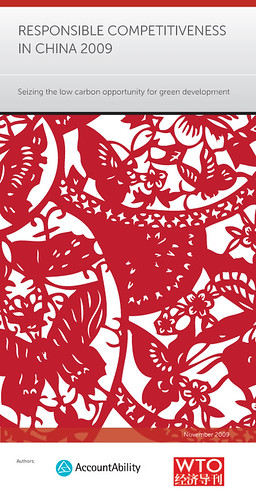
On November 30, I joined colleagues at the EU China Business Summit in Nanjing, Jiangsu, which dovetailed with the EU-China political meeting.
That day in Nanjing, under support from the Sino-Swedish Corporate Social Responsibility cooperation, AccountAbility launched the report Responsible Competitiveness in China 2009: Seizing the low carbon opportunity for green development.
This from AccountAbility:
Businesses in China are increasingly working with government and civil society to shift markets to reward sustainable development. These responsible business practices are becoming more and more embedded in the country’s emerging green industrial policy and low carbon development pathways. In some areas, China is set to leapfrog into the elite group of global green innovators.
These are some of the highlights from the report ‘Responsible Competitiveness in China 2009: Seizing the low carbon opportunity for green development’, launched at the 5th annual EU-China Business Summit as part of the Swedish EU presidency on 30 November in Nanjing, China.
The analysis presented in this report shows that China is developing a distinctive low carbon, responsible pathway, namely that:
- Low carbon industrial policies offer Chinese businesses and consumers huge opportunities
- Responsible business ventures in China are now impacting global markets relaunching China’s brand
- Strong government leadership, incentives and supportive policies are playing key roles
The report was independently researched and written in a unique collaboration between AccountAbility and the China WTO Tribune, with support from the Sino-Swedish CSR Cooperation Project. Learn more about the report’s key findings.
The Joint Statement of the 12th EU-China Summit specifically “decided to strengthen high-level dialogue and exchanges between think-tanks from both sides, and to promote and support regular exchanges.” Read the Joint Statement in full. AccountAbility’s partnership with the China WTO Tribune is an example of this kind of knowledge and collaboration exchange.
November 18th, 2009 by JJW
 I took Obama’s visit as a chance to write about how company action should play a more prominent role in the trust building and competitiveness equation of the Sino-US relationship. My Guardian article, A green call to arms, (link to Chinese version here) centers on climate change. Meanwhile, my ChinaDialogue piece, Obama’s China moment (and the Chinese version) addresses wider issues of corporate social responsibility. I focus especially on sustainability standards and other global “rules of the game” that the US and Chinese governments should encourage companies to improve jointly.
I took Obama’s visit as a chance to write about how company action should play a more prominent role in the trust building and competitiveness equation of the Sino-US relationship. My Guardian article, A green call to arms, (link to Chinese version here) centers on climate change. Meanwhile, my ChinaDialogue piece, Obama’s China moment (and the Chinese version) addresses wider issues of corporate social responsibility. I focus especially on sustainability standards and other global “rules of the game” that the US and Chinese governments should encourage companies to improve jointly.
Guardian: A green call to arms (Chinese)
ChinaDialogue: Obama’s China moment (Chinese)







 I spoke in June at the ISEAL Alliance annual conference, “Through the Looking Glass: The Future of Social and Environmental Standards,” in London on prospects for voluntary standards development in China and from a base in China. Here’s a bit of background and a summary of my
I spoke in June at the ISEAL Alliance annual conference, “Through the Looking Glass: The Future of Social and Environmental Standards,” in London on prospects for voluntary standards development in China and from a base in China. Here’s a bit of background and a summary of my  International voluntary standards systems (and ISEAL Alliance members in particular) are reshaping international markets through numerous ways. They help companies “compete up” on social and environmental impacts by offering credible market signals for what economic theory used to call externalities. These standards help governments enforce environmental regulations like the Lacey Act that prohibits importation of unsustainable wood in the US. They can hep companies and governments procure goods and services sustainably.
International voluntary standards systems (and ISEAL Alliance members in particular) are reshaping international markets through numerous ways. They help companies “compete up” on social and environmental impacts by offering credible market signals for what economic theory used to call externalities. These standards help governments enforce environmental regulations like the Lacey Act that prohibits importation of unsustainable wood in the US. They can hep companies and governments procure goods and services sustainably.

 I took Obama’s visit as a chance to write about how company action should play a more prominent role in the trust building and competitiveness equation of the Sino-US relationship. My Guardian article,
I took Obama’s visit as a chance to write about how company action should play a more prominent role in the trust building and competitiveness equation of the Sino-US relationship. My Guardian article, 